UNIT 3: Ancient Egypt
Key Unit Competence: Use language used in the context of
Ancient Egypt.
Introductory activity: Look at the given pictures and tell whichcivilization they belong to.
The study of Ancient Egypt is a fascinating one. It is the study of a
civilisation that began over five thousand years ago and lasted for
over three thousand years. Although the beginnings of Egyptian
history are usually given as about 3100 B.C., remains have been
found of nomadic people from many thousands of years beforethis date.
When we study Ancient Egypt, we are studying a civilisation that
lived in the past and no longer exists today. Therefore, we need to
make use of the past tenses to discuss and write about it. We will
also need to learn some new vocabulary to equip us on ourjourney of discovery.
Did you know?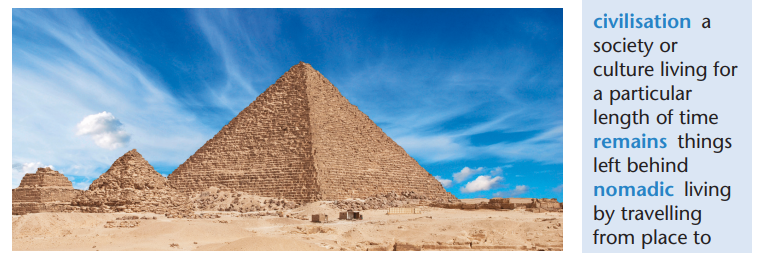
Historians use the abbreviations B.C. (Before Christ) and A.D. (Anno Domini i.e.‘Year of our Lord’) to distinguish dates.
Who were the Ancient Egyptians?
Read about prehistoric Egypt
Even before the beginnings of the Egyptian civilisation as we know it, the
early Egyptians had been farmers. They had herded cattle. Before they
developed agriculture, they fished in the Nile River. They had made stone
tools. They made pots. Until the Egyptians built their palaces, theprehistoric Egyptians did not have any large buildings.
Activity 1: Hold a debate about climate change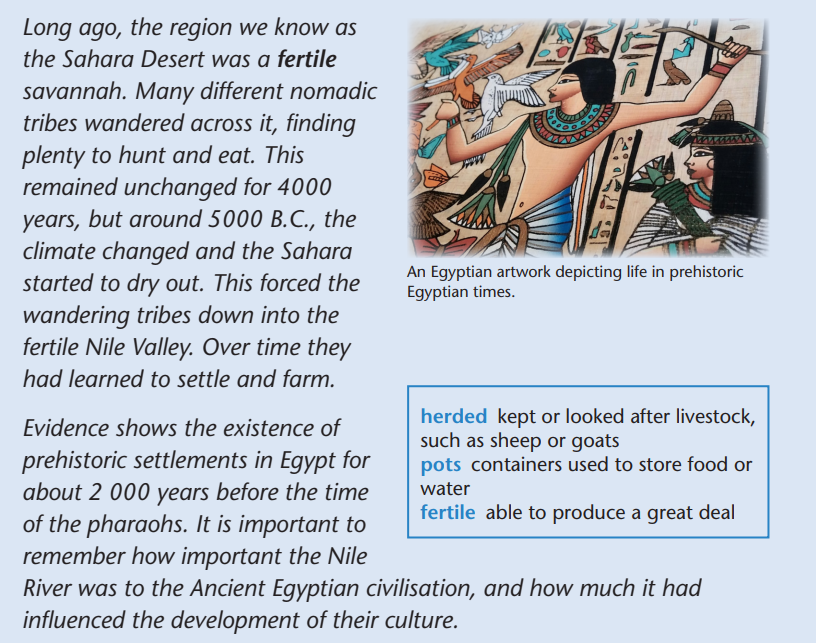
Hold a debate about the statement: Climate change was an important factor in
the development of Ancient Egypt. Elect two teams, one to argue for thestatement, and one to argue against the statement.
Grammar focus
Use the past simple tense
We use the past simple tense to talk about an action that was completed in a
time before now. The length of time of the action is not important. The
important thing is that the action is over. The action could have happened inthe recent past or in the distant past.
Examples:
• My father died last year.
• Jean-Paul caught the train to South Africa in 2012.• We lived in Kigali until 2013.
You always use the simple past tense when you say when something happened,
so it is associated with certain past time expressions. We usually make the
positive by adding ‘-ed’ to the infinitive. For example, ‘walk’ becomes ‘walked’.We make the verb negative by adding ‘did not’ (didn’t).
Some verbs are irregular. You will need to learn each one separately. For
example, ‘be’ changes to ‘was’, ‘have’ changes to ‘had’, ‘go’ changes to ‘went’
and ‘do’ changes to ‘did’. The following table shows the past simple tense ofthe verbs ‘be’, ‘have’ and ‘do’:
Activity 2: Practise the simple past tense
Put the following sentences into the past simple, using the correct form of the
verb in brackets:
1. We ______ (talk) on the phone yesterday.
2. The two boys _______ (do) not eat the cake.
3. They __________ (be) very hungry by lunchtime.
4. He _________ (walk) all the way home alone.5. She _________ (do) her homework on Tuesday.
Read about the beginnings of the Egyptian civilisation
The history of Ancient Egypt is divided into different periods of time. The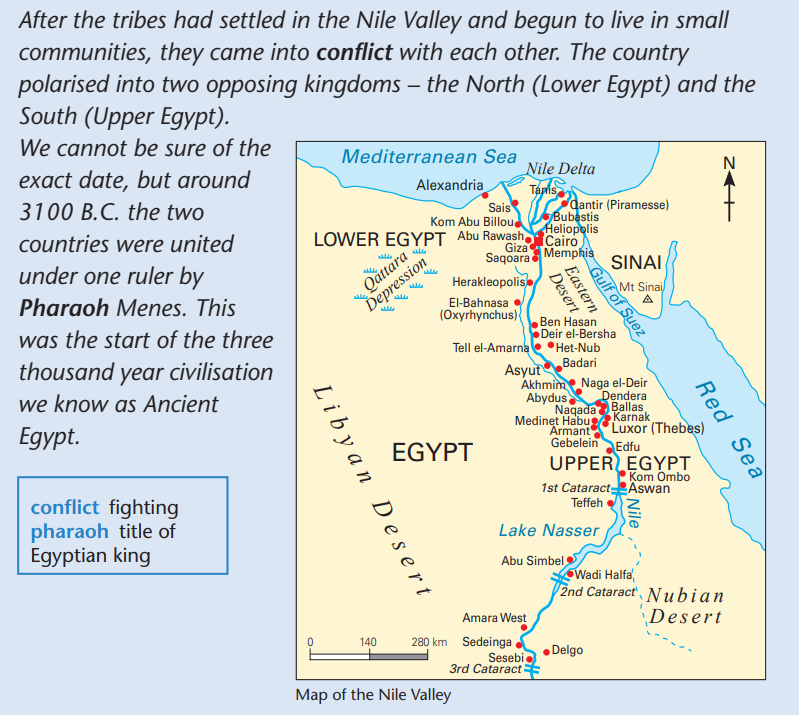
most important of these were the Old Kingdom (3100–2180 B.C.), the
Middle Kingdom (2055–1650 B.C.) and the New Kingdom (1550–
1069 B.C.) Towards the end of each of these periods, the authority of the
king broke down and Egypt fragmented into many small kingdoms, onlyto be reunited when a strong ruler became pharaoh.
Grammar focus
Past simple tense
1. The past simple tense indicates historical events/completed actions.
For example: Egypt fragmented into many small kingdoms.
2. We use the past perfect tense most often for the following:
• To show first event before another in the past. The second / last event to
happen may be known or understood.
For example:
• The Pharaoh had left big pyramids to Egypt
• When I got home yesterday, my mother had already cooked dinner.
• Reported speech.
For example:
• My father told me that he had cooked dinner but he had not.
• ‘If’ (conditional) sentences.
For example:
• If I had known that my mother had already cooked dinner, I would
have been home earlier.
The past perfect tense in English is made up of two parts: the past tense of the
verb ‘to have (had)’ + the past participle of the main verb.
Can you pick out other examples of sentences in the past simple tense in the
reading above?Use the past perfect tense.
Activity 3: Use the past perfect tense
Complete the following sentences:
1. I got home very late last night. Everyone ________ ______ to bed.
2. Before coming to Rwanda, I ________ never _________ gorillas.
3. As soon as he _______ ________ his homework, he went to bed.
4. The film was not very good, but I didn’t want to leave until it _________
__________.
5. She ______ just _______ into the bath when the doorbell rang.
6. Now reread the first paragraph about prehistoric Egypt and see how manypast perfect sentences you can find.
Read about the pharaohs
Activity 4: Answer comprehension questions on Ancient Egypt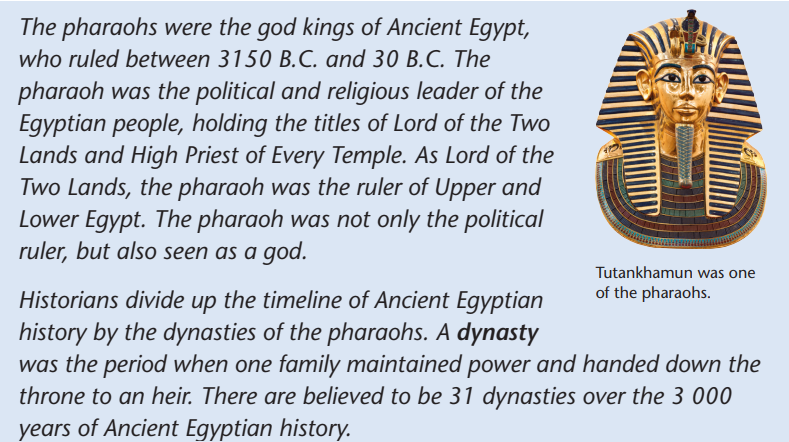
1. Look at the map of Egypt and name one city in Upper Egypt and one city in
Lower Egypt.
2. Name the three main periods of time used to describe the Ancient Egyptian
civilisation.
3. What is meant by the word ‘dynasty’?
4. Briefly describe the role of the pharaoh.5. What effect did the rise of the Greek and Roman civilisations have on Egypt?
Read about the economy of Ancient Egypt
The early Egyptians were farmers. The annual flooding of the Nile River
made the soil very fertile and Egypt was able to grow better harvests than
her neighbours. The main crops of Egypt were wheat, barley, lettuce,
beans, onions, figs, melons and cucumbers. Many farmers also grew flax,
which was used to produce linen.
There was no money system. Products were bartered and workers were
paid in wheat, barley and craft products such as pottery and clothes.Crafts were produced in small workshops.
Trade was important to Egypt. They traded with countries around the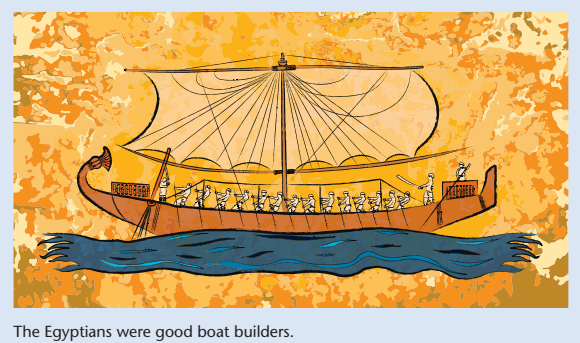
Mediterranean Sea, the Red Sea and the Aegean Sea. The main exports
were gold and other minerals, wheat, barley and papyrus sheets. The
main imports were silver, iron, ivory, cattle and spices. Egypt also haddeposits of minerals, such as limestone, copper, gold, tin and sandstone.
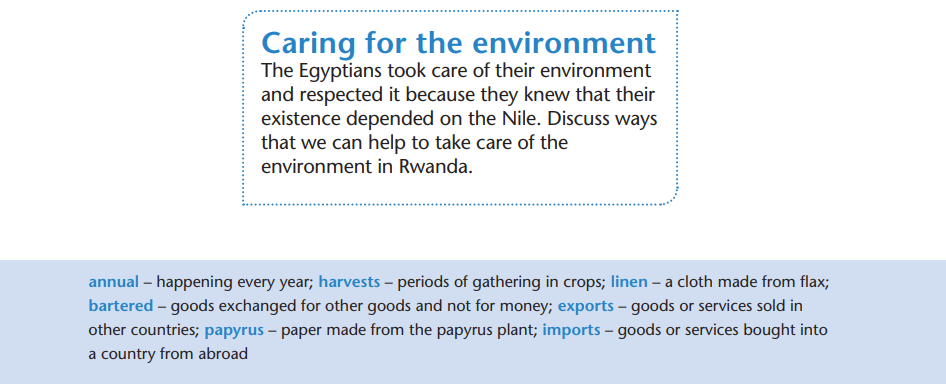
Read about the religious beliefs of the Ancient Egyptians
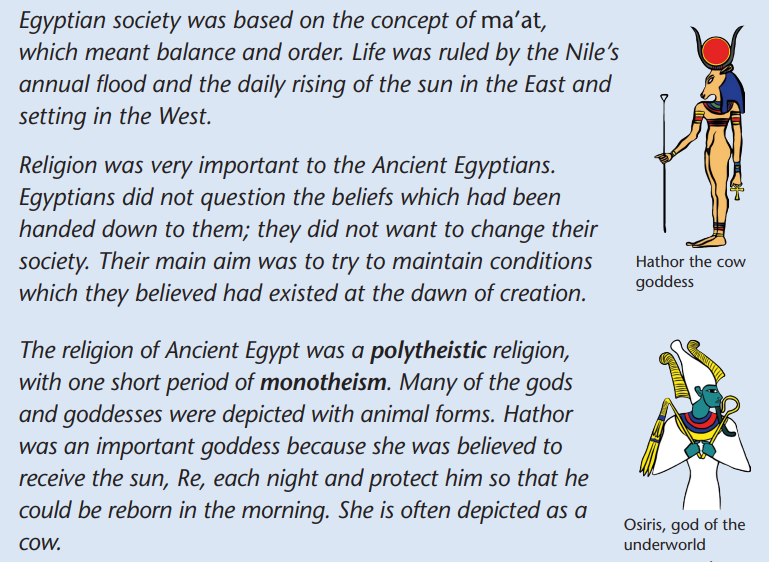
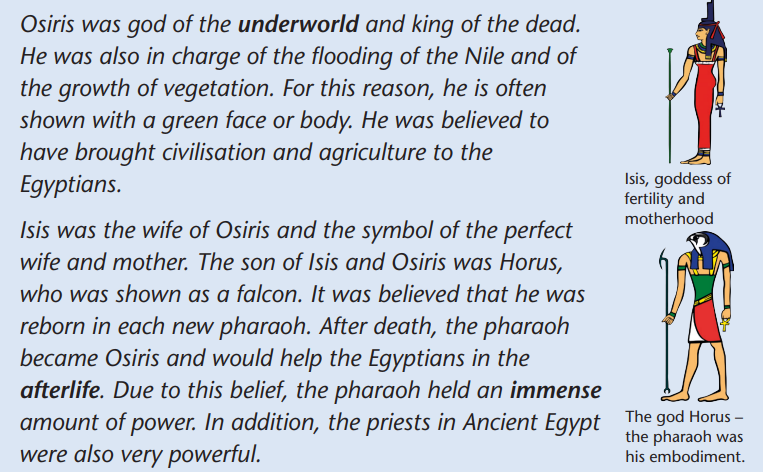
Activity 5: Write sentences in the past perfect tense
Use the information on the religious beliefs of the Ancient Egyptians to write fivesentences about their beliefs, using the past perfect tense.
Sometimes we use the passive voice because it is more polite than the active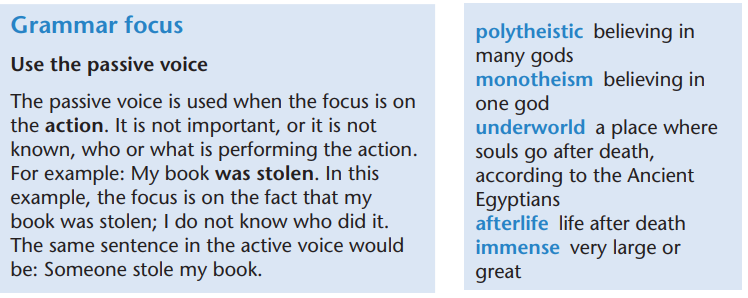
voice. For example: A mistake was made. This is gentler or more polite thansaying: He made a mistake.
If we want to say who or what performs the action while using the passive voice,
we use the preposition ‘by’. When we know who performed the action and are
interested in him, it is always better to switch to the active voice instead. For
example: This house was built by my father. The same sentence in the activevoice would be: My father built this house.
When rewriting active sentences in passive voice, it is important to note the
following:
• The passive sentence starts with the object.
• The finite form of the verb is changed (‘to be’ + past participle).
• The subject of the sentence follows the verb (or is dropped).• If a subject is used, it is preceded by the preposition ‘by’.
Activity 6: Change the active voice to the passive voice
Rewrite the following sentences in the passive voice:
1. Jean-Marc is writing a letter.
2. My mother is baking a cake.
3. My friend is mending his bicycle tyre.
4. My friend is having a birthday party on Saturday.5. Our cat caught a large rat.
Read about building the pyramids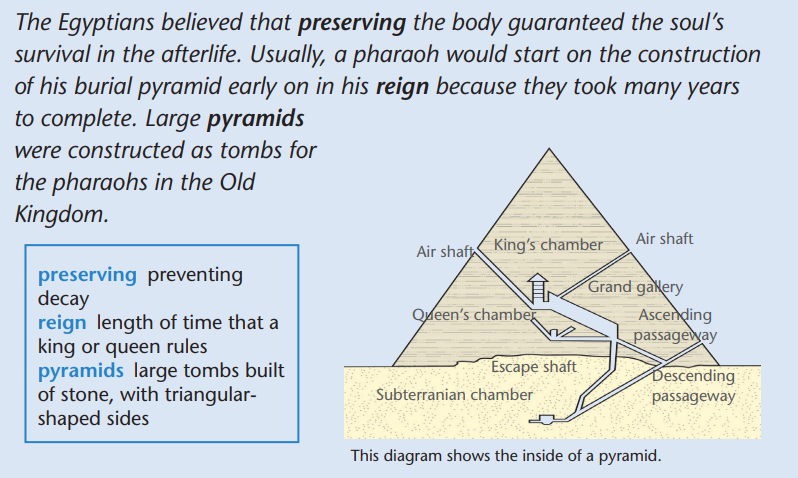
The tombs contained decorations of the pharaoh’s journey in the afterlife
and texts from the Book of the Dead. The pharaohs were buried with
treasures made of gold and jewels. Later, to avoid grave robbers, the
pharaohs were buried in secret tombs cut into rock. Many of these canstill be visited in the famous Valley of the Kings.
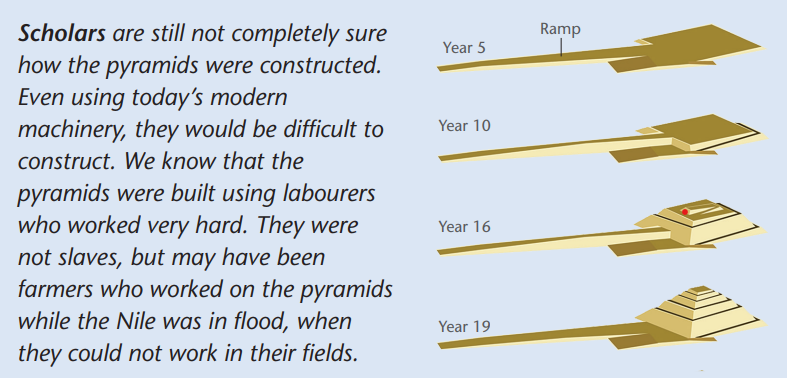
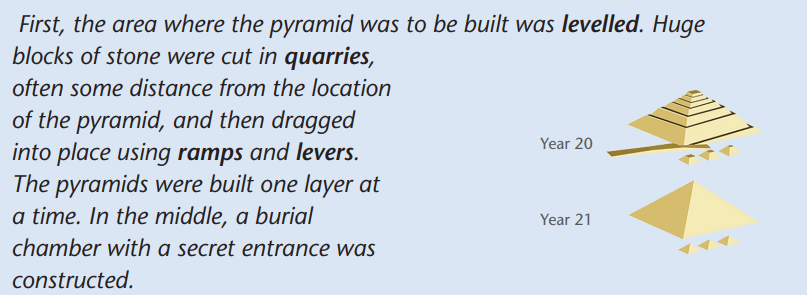
Grammar focus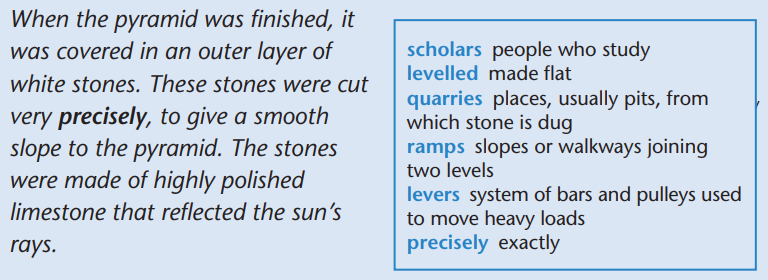
Past simple passive
The past simple passive is used to insist or emphasize that a specific action was
done sometime in the past. For example: The walls were made of highly
polished limestone. (Here, it is not known who performed the action. The stones
for the pyramids were dragged by the labourers. (Here, the subject – thelabourers – is preceded by the preposition ‘by’.)
Activity 7: Write a report about the building of the pyramids
Research and write a short report of under 200 words about the pyramids. Your
report should explain when the pyramids were built, whom they were built for,
and how they were built. Include diagrams wherever possible. Make sure youuse the past simple passive wherever possible.
Read about the achievements of the Ancient Egyptians
The Egyptians kept the process of making the parchment a secret so that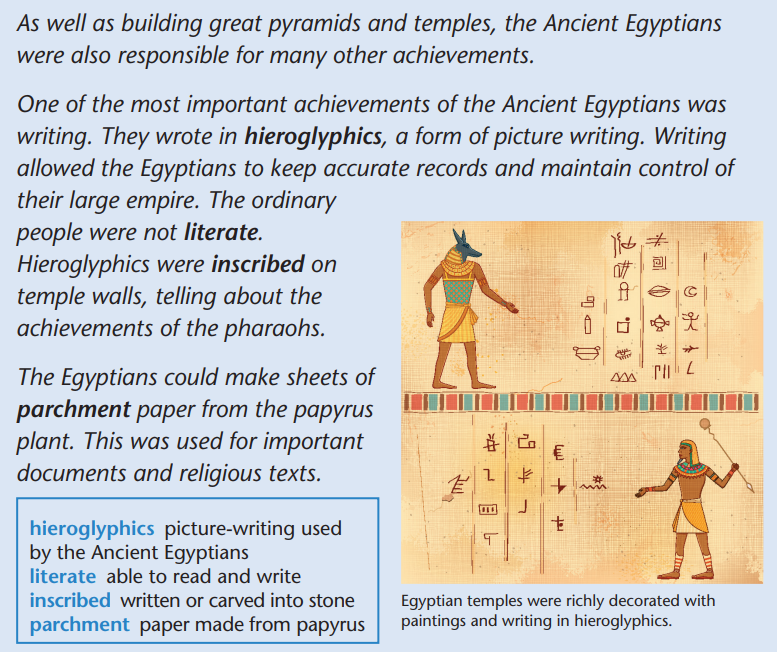
they could sell it to other civilisations, such as Ancient Greece.
The Ancient Egyptians were very knowledgeable about medicine. They
had a wide variety of medicines and cures. Some of their medicines were
strange. For example, they used honey and human brains to cure eye
infections. Many of their medicines were accompanied by spells to wardoff the evil spirits making the person sick.
Because the Nile River was so important in the lives of the Egyptians, they
were very good shipbuilders. They originally built small boats from
papyrus reeds, but later began to build large ships from cedar woodimported from Lebanon.
The Egyptians had a good understanding of engineering, mathematics
and geometry. This enabled them to build the pyramids and other large
buildings. Mathematics and numbers allowed them to keep track ofbusiness transactions.
One of the amazing achievements of the Egyptians was inventing the
calendar. This enabled them to know at what time of the year the Nile
River would flood. Another scientific achievement was inventing the
Nileometer. Nileometers were very important to the Egyptians. With a
Nileometer, the Egyptians could measure the rising water levels of the Nile
River so that they could predict a possible flood and take action beforelives or crops were endangered.
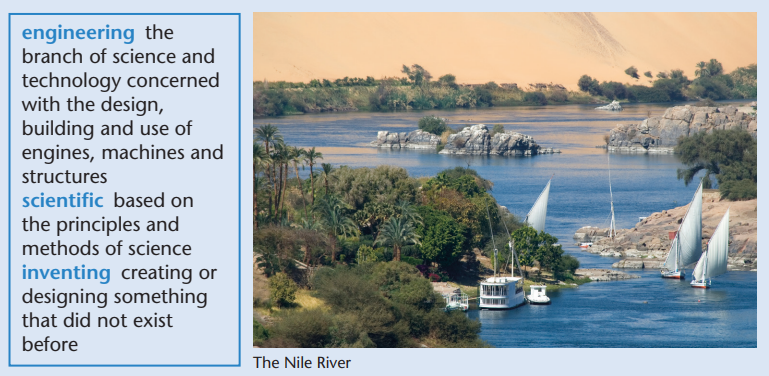
Grammar focus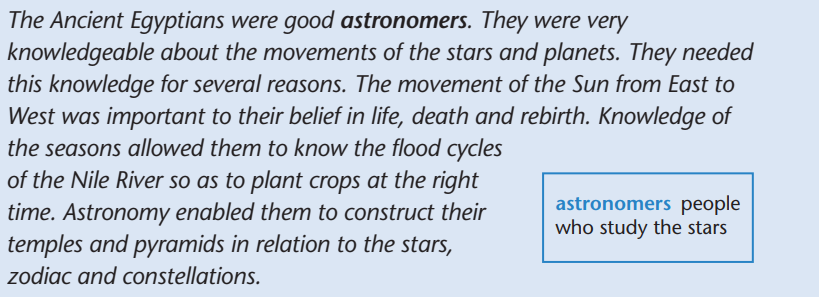
The third conditional
The third conditional is used to talk about something in the past that did not
happen, and which may not happen at all. We make it by using the past perfecttense after ‘if’ or by inverting the Auxiliary HAD and its subject.
Examples:
• If they had not had a problem with grave robbers, the Egyptians would
have kept on building pyramids.
• The Egyptians would not have had paper if they had not learned how tomake it from papyrus.
Activity 8: Discuss the achievements of the Ancient Egyptians
1. Discuss the achievements of the Ancient Egyptians.
2. How important was the relationship between knowledge and achievement?3. Try to use the third conditional in your discussions with each other.
Activity 9: Write about the achievements of the Ancient Egyptians
Write a paragraph about the achievements of the Ancient Egyptians, making useof abstract nouns with ‘allowed to’ and ‘enabled to’, as well as ‘could’.
Vocabulary, pronunciation and spelling
Activity 10: Use your dictionary
Writing and understanding
Activity 11: Write about life in Ancient EgyptWrite a short essay of about 200 words entitled, ‘If I had lived in Ancient Egypt …’.
Religious tolerance: What can we learn fromthe Ancient Egyptians?
We have learned that the Ancient Egyptians were polytheistic and
worshipped many different gods. One home might have had a
shrine to a particular god or goddess, such as Isis, and the
neighbouring home might have had a shrine to another deity,such as Horus. There was no conflict over differences of worship.
Activity 12: Discuss religious tolerance
1. In your groups, brainstorm and list all the different forms and places of
worship in your district.2. Why do you think we should respect each other’s religious beliefs?
Text: Read the following passage and answer the questionsbellow
Ancient Egyptian medicine
The art of medicine of the ancient Egypt is extensively
documented from the 33rd century BC until 6th century BC.
Ancient Egyptians suffered from diseases like headache and
emotional stress especially among tomb builders; various
infectious diseases such as tuberculosis and worm infection;
kidney stones; snake or scorpion bites; poliomyelitis; leprosy,and plague.
Egyptian doctors were the first to discover how the human body
works and they knew that the heart, pulse rates, blood and air
were important to the workings of the human body. A heart thatbeat feebly told doctors that the patient had problems.
The ancient Egyptians practiced medicine with highly professionalmethods. They had advanced knowledge of anatomy and surgery.
Also, they treated a lot of diseases including dental, gynecological,
gastrointestinal, and urinary disorders. They could diagnosediabetes and cancer.
Surgery was performed on a routine basis in ancient
Egypt. Egyptians used antiseptic to aid the healing process,
another major development in medical practice. The earliest
known form of surgery was performed in Egypt around 2750 BC.
It is now known that Egyptian medicine contributed greatly to
modern medicine. Many of the therapies used today are similar to
those used in ancient Egyptian times such as the method of
treating a fractured bone. Indeed, they were the first to use
electrotherapy to cure pain… More than 3,500 years ago, the
ancient Egyptians used willow bark as a traditional medicine forpain relief.
Comprehension questions
1. How could doctors diagnose whether a patient had cardiovascular
problems?
2. Since when did ancient Egyptians start performing surgery?
3. Explain how ancient Egyptian medicine contributed to modernmedicine.
Vocabulary
Construct your own sentences using each of the following words
a) emotional stress
b) kidney stones
c) scorpion
d) poliomyelitis
e) pulse rates
f) feebly
g) gastrointestinal
h) antiseptic
i) electrotherapyj) willow bark
Application activity
1. Write a composition describing ancient Egyptian medicine.
Assessment
1. Choose the correct words or phrase from the following to complete
each sentence:
could, be able to, lead to, allow to, enabled to
a) I need to get good grades in Science so that I will ____
____ ____ study medicine.
b) My friend asked if she _______ come to the cinema
with us.
c) The annual flooding of the Nile _______ the Egyptians
_______ grow crops.
d) Smoking cigarettes can ____ ____ lung cancer.
e) I do not know if my parents will _______ me _______go out tonight.
3. Use the correct past simple form of the verb in brackets
to complete the following sentences:
a) They _______ (walk) to the shops yesterday.
b) He told me that he _______ (do not) use your bicycle
without asking.
c) The sunset _______ (be) beautiful last night. (3 marks)
4. Use the correct past perfect form of the verb in brackets
to complete the following sentences:
a) I did not have any money because I ____ ____ (leave)
my wallet at home.
b) Eugenie ____ ____ (wanted) a guitar, but she received
a book.
c) My father ____ ____ (own) this house for ten years
before he sold it. (3 marks)
5. Change the following sentences from the active voice to
the passive voice:
a) Harry ate six mangoes at dinner.
b) Magnificent gorillas roam the mountainous
highlands of Rwanda.
c) My mom read the novel in one day.d) Who taught you to ride a bike? (4 marks)
